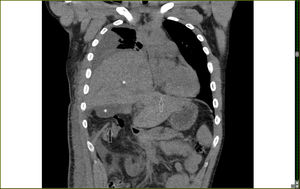This is the case of a 24-year-old man with closed thoracoabdominal trauma, fractures in 3rd to 10th right ribs, and hemo-pneumothorax after motorcycle accident. The patient presents worsening respiratory symptoms 1 week later as seen on the thoracoabdominal CT scan (Fig. 1) and MRI (Fig. 2) performed. A diaphragmatic defect (12 cm in diameter) is confirmed (arrows) with complete herniation of the patient’s right hepatic lobe and biliary vesicle (asterisks). Emergency surgical repair was performed with satisfactory outcomes.
The rate of occurrence of diaphragmatic rupture is between 1% and 7% of all closed thoracoabdominal traumas reported due to an increased transdiaphragmatic pressure with tear of muscle fibers and/or avulsion of their insertion. This lesion often goes misdiagnosed. However, obstructive symptoms often appear due to incarcerated organs or following extubation after negativization of intrathoracic pressure. This entity should, therefore, be suspected, and the mechanism of trauma known for a proper diagnosis.
Please cite this article as: García Herrera AN, Usón García E. Rotura diafragmática postraumática. Med Intensiva. 2022;46:120.









